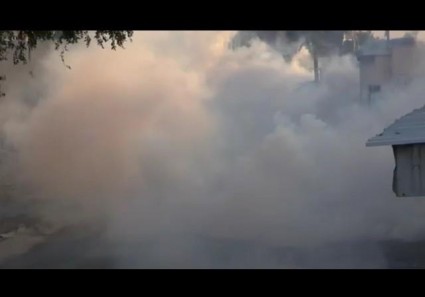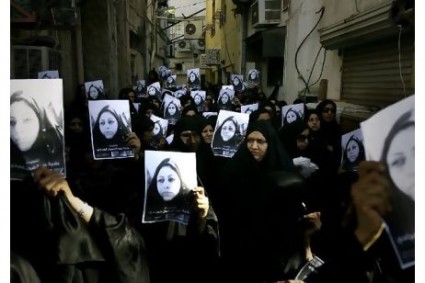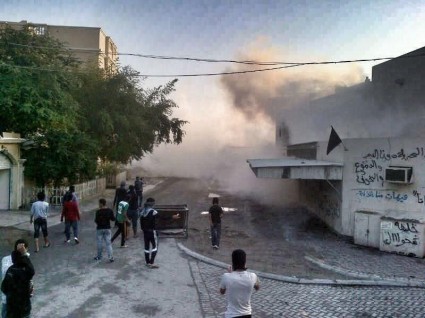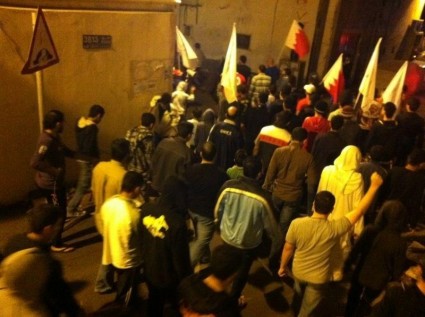Hamad, confused why he can’t find anyone for his “dialogue” – only dialogue left is about your exodus
December 19, 2012 No Comments
Between 16-17 December 25 people arrested, 31 villages attacked in violent assaults
December 19, 2012 No Comments
Almqha Marches for Freedom
December 19, 2012 No Comments
Revolution is knocking at the door Hamad
December 19, 2012 No Comments
The Revolution will Continue – Rajab Behind Bahraini Prison Bars: “I Am Free…Western Silence is Bought with Oil and Arms Deals”
Imprisoned Bahraini activist Nabeel Rajab speaks from behind bars with Rasha Abi Haydar, assuring listeners that despite the regime’s attempts, the peaceful revolution will continue.
Nabeel Rajab to As-Safir From Behind Bahraini Prison Bars: I Am Free…Western Silence is Bought With Oil and Arms Deals
Author: Rasha Abi Haydar – 14 December, 2012 – Translated 18 Decemebr, 2012 by: Tyler Huffman – Al Monitor – As-Safir
Nabeel Rajab is the most influential figure in Bahrain. He is a human rights activist who has been in prison since June 7, and a few days ago was sentenced to two more years in prison — after an initial sentence of three — on charges of organizing “unauthorized gatherings.” Since his arrest, Rajab has become a nuisance and a threat to the authorities’ prestige, and has exposed their continued violations.
Only a few days before his arrest, Rajab met with colleagues from As-Safir in an area that he “loves as much as Bahrain”: Hamra Street in Beirut. Today, after several attempts, As-Safir has succeeded in making his voice heard by the world. No one can silence his statements from behind prison bars.
As-Safir: Why did the judiciary uphold your imprisonment, when the sentences for similar charges are usually much lighter?
Rajab: In fact, the damage incurred by the Bahraini regime as a result of my imprisonment — in terms of its international reputation and image — outweighs the damage this imprisonment inflicts on my own liberties. Keeping a human rights activist in jail all this time because he participated in or called for peaceful demonstrations is something that the civilized world no longer accepts. I was shocked by the judgement issued against me because of something I posted on Twitter, or because [I organized] an unauthorized protest. I didn’t expect the authorities to imprison me as a result of such trivial charges, at a time when it is trying to appear as though it respects human rights.
The authorities claim that they do not prevent anyone from exercising his or her right to demonstrate, but the reality contradicts this. Bahraini prisons are teeming with detainees whose only charge is participating in peaceful marches against the government. Yet, unfortunately, the media has not highlighted their cases as they have mine.
The convictions issued against me reveal the size of the imbalance in the Bahraini judiciary, as well as the extent of the judiciary’s submission to the executive authorities. These charges have drawn international attention to the nature of the regime in Bahrain, and proved to the world that the authorities have had enough of my continued criticisms in the media and the press. [This has proven] that the authorities are willing to violate international law — regardless of the extent of these violations — in order to silence me.
As-Safir: But do you pose a threat to the regime, to the extent that they would imprison you for such a long period?
Rajab: I do not pose a threat to any political system. I am a rights activist. I have not, and do not, call for regime change or a coup. I defend the right of everyone to express their views and demands peacefully. The right to expression is guaranteed to all, both those who call for the reform of the regime and those who call for regime change. Had the regime dealt with these rights in the proper manner, there would been no opposition to the regime today. But the regime is afflicted with greed and tyranny, and is blind to anything but its own interests.
Here I want to tell the authorities that they must understand that violence only begets violence. All past experiences have confirmed that violence does not produce solutions, but only produces more violence and killing, and the past two years in Bahrain are the best proof of that. The continued ratifications of laws and legislation that restrict freedoms will not work.
As-Safir: Why has the regime declared war on human rights activists?
Rajab: This culture of human rights activism is new to the Arab world, and likewise to Bahrain, and human rights activists have had a lot of influence on people because their movements focus on demanding respect for moral and humanitarian standards, principles and values — far removed from seeking political positions or calling for specific political systems. Unfortunately, instead of working with human rights activists as experts [who can help] reform the legal structure to serve the people, the regime has considered them a direct threat to its existence, and decided to wage war on them.
The question here is: Has this targeting succeeded in stopping those demanding their rights? Of course not — in fact, the opposite is true. I believe that the regime now knows that imprisoning activists will not stop this phenomenon. Rather, the oppression practiced by the regime will spread this culture [of activism] more quickly. It has become clear that my imprisonment has doubled the amount of rights activism in Bahrain; it will not stop it or limit it.
[Read more →]
December 19, 2012 No Comments
Bahrain regime continue in self defeating litany of brutality and repression
Bahraini forces fire tear gas on Manama protests
18 December, 2012 – Islamic Invitation Turkey
Saudi-backed Bahraini forces have fired tear gas to disperse anti-regime protesters in the capital as Manama’s crackdown on the opposition continue.
Witnesses say hundreds of Bahrainis took to the streets across the capital overnight to protest against the ruling Al Khalifa family.
Activists say the situation in the capital remains volatile and that the military has set up checkpoints in and around Manama to prevent further demonstrations.
On Monday, regime forces arrested over 25 demonstrators in and around the capital, who took to the streets to call for the release of all jailed activists and demanded that King Hamad bin Isa Al Khalifa step down.
Sayed Yousif Al-Muhafda, the head of monitoring and evaluation of the Bahrain Center for Human Rights, was among those arrested. Bahraini forces used tear gas, rubber bullets, and stun grenades to break up the demonstrations.
Opposition rallies have continued in Bahrain in defiance of a government ban on public gatherings. The government’s harsh crackdown on demonstrations has also failed to keep protesters off the streets.
Scores have been killed, many of them under torture while in custody, and thousands more detained since the popular uprising in Bahrain began in mid-February 2011.
Protesters say they will continue holding anti-regime demonstrations until their demand for the establishment of a democratically-elected government is met. …source
December 19, 2012 No Comments
Bahrain: “rights denied” – protest ban defied
December 19, 2012 No Comments
Arming Offensively – US prepares ‘Vertically Integrated’ Gulf Allies for the Dirty work of War
U.S. arms to Gulf allies hint of strategy
By Rowan Scarborough – The Washington Times – 16 December, 2012
The largest infusion of U.S. arms ever for Persian Gulf allies has shifted more toward offensive weapons at the same time that President Obama’s military strategy says it will rely more on allied firepower in any future war.
The only war on the horizon for Saudi Arabia, the United Arab Emirates and four other Gulf coalition partners would be with nearby Iran.
Noting U.S. sales of air defense-penetrating F-16s and F-15s, satellite-guided bombs and a pending order for ordnance that can burrow deep and then explode, analysts say Gulf nations could participate in a U.S. air campaign to strike Iran’s nuclear sites.
These American-armed nations could either be part of an overall war plan or be forced to enter the battle once Iran counterattacks, as expected, with missile launches.
“The thinking certainly is that Iran would retaliate against the Gulf states, or at least against the facilities in the Gulf that we use,” said Kenneth Katzman, a Middle East analyst at the Congressional Research Service. “That would certainly draw the Gulf states into any conflict that went on. The Gulf might become embroiled in this conflict, and I think they’ve calculated it’s best to be prepared.”
There has been public focus on the U.S. military buildup in the Gulf — more aircraft carriers, warplanes and strike groups studded with Tomahawk cruise missiles; more minesweeping ships; a visit by Air Force F-22 stealth jets; and thousands of Army soldiers positioned in Kuwait.
But just as methodically, the George W. Bush and Obama administrations have approved a series of large arms sales that are giving some oil-rich Gulf states offensive capabilities that would make Iran think twice about an attack.
Defense Secretary Leon E. Panetta underscored the alliance Dec. 11 when he landed in Kuwait, a staunch Gulf ally, for consultations. He also spoke to some of the 13,500 U.S. troops stationed there.
“Our presence in Kuwait and throughout the Gulf helps advance the capabilities of partnering nations, deters aggression and helps ensure we’re better able to respond to crisis in the region,” Mr. Panetta told reporters beforehand.
At a Kuwait air base, he said America has 50,000 troops and an armada of warships in the region.
Desert Falcons
Mr. Obama’s strategic guidance in January enabled cuts in U.S. troop strength in part by saying that allies would be tasked with providing more firepower in future wars. To observers, that seems to mean the Gulf states would be asked to do more.
The Congressional Research Service, which tracks global arms sales, took special note in its latest report on U.S. weapons pouring into the Gulf states of Saudi Arabia, the United Arab Emirates, Qatar, Oman, Kuwait and Bahrain.
“The U.S. arms agreements with Saudi Arabia were extraordinary, and represent, by far, the largest share of U.S. agreements with the world or developing world in 2011,” the Congressional Research Service said.
Of $56 billion in total U.S. arms sales in 2011 to developing nations, more than half — $33 billion — were inked with the Saudi kingdom. U.S. defense contractors have seen a sales increase from $14 billion in contracts in 2010 to $56 billion in 2011, mostly thanks to oil-rich Gulf states.
In addition, some of the offensive hardware that the Gulf states have received from the U.S. is as good or in some cases better than the U.S. military’s.
Lockheed Martin has been selling the United Arab Emirates an F-16 “Desert Falcon” version known as “Block 60,” for which the country bankrolled the $3 billion development costs. According to DefenseIndustryDaily.com, it is a notch better than the latest Fighting Falcons flown by U.S. pilots.
The Desert Falcons boast extended range, new radars and targeting pods that clearly make the jet an offensive threat against Iran directly across Gulf waters.
The United Arab Emirates has been buying and flying Block 60s since the previous decade. It plans at some point to add other weapons — 2,000-pound bunker-busting bombs used against buried, cemented targets. Obama administration officials said a year ago that they were working to complete the sale.
“It’s perfectly possible the UAE could be asked to try to bomb aircraft shelters, hardened aircraft hangars’ stockpiles, coastal missile sites that are hardened,” Mr. Katzman said. “There are a range of targets that coalition partners like UAE could be asked to take out as part of strike package, if it comes to that.” …more
December 19, 2012 No Comments
Torture, An All-American Nightmare
Why Zero Dark Thirty Won’t Settle the Torture Question or Purge Torture From the American System
An All-American Nightmare
By Peter Van Buren – 18 December, 2012 – TomDispatch
If you look backward you see a nightmare. If you look forward you become the nightmare.
There’s one particular nightmare that Americans need to face: in the first decade of the twenty-first century we tortured people as national policy. One day, we’re going to have to confront the reality of what that meant, of what effect it had on its victims and on us, too, we who condoned, supported, or at least allowed it to happen, either passively or with guilty (or guiltless) gusto. If not, torture won’t go away. It can’t be disappeared like the body of a political prisoner, or conveniently deep-sixed simply by wishing it elsewhere or pretending it never happened or closing our bureaucratic eyes. After the fact, torture can only be dealt with by staring directly into the nightmare that changed us — that, like it or not, helped make us who we now are.
The president, a Nobel Peace Prize winner, has made it clear that no further investigations or inquiries will be made into America’s decade of torture. His Justice Department failed to prosecute a single torturer or any of those who helped cover up evidence of the torture practices. But it did deliver a jail sentence to one ex-CIA officer who refused to be trained to torture and was among the first at the CIA to publicly admit that the torture program was real.
At what passes for trials at our prison camp in Guantanamo, Cuba, disclosure of the details of torture is forbidden, effectively preventing anyone from learning anything about what the CIA did with its victims. We are encouraged to do what’s best for America and, as Barack Obama put it, “look forward, not backward,” with the same zeal as, after 9/11, we were encouraged to save America by going shopping.
Looking into the Eyes of the Tortured
Torture does not leave its victims, nor does it leave a nation that condones it. As an act, it is all about pain, but even more about degradation and humiliation. It destroys its victims, but also demeans those who perpetrate it. I know, because in the course of my 24 years as a State Department officer, I spoke with two men who had been tortured, both by allies of the United States and with at least the tacit approval of Washington. While these men were tortured, Americans in a position to know chose to look the other way for reasons of politics. These men were not movie characters, but complex flesh-and-blood human beings. Meet just one of them once and, I assure you, you’ll never follow the president’s guidance and move forward trying to forget. …more
December 19, 2012 No Comments
US floats article portraying Syrian Terrorists as concerned protectors of chemical weapons
Syria rebels fear chemical weapons
19 December, 2012 – Associated Press – The Daily Star
ANTAKYA, Turkey: The new Syrian rebel commander has told The Associated Press that his fighters are monitoring the regime’s chemical weapons sites, but don’t have the means to seize and secure them.
Gen. Salim Idris, who defected from the Syrian army in July, says he is “very afraid” a cornered regime will use chemical weapons in Syria’s civil war. Syria is said to have one of the world’s largest chemical arsenals.
Idris portrayed Syrian President Bashar Assad as a figurehead, saying decisions are made by Assad’s inner circle from the Alawite minority. Idris says the ruling elite won’t surrender and is willing to “set everything on fire.”
Idris also said late Tuesday that the regime has fired three Scud missiles so far and has more trained on northwestern Syria, ready to fire.
December 19, 2012 No Comments
Obama’s Human Rights Abusing ‘friends’ in Bahrain imprison children, without charges, in adult facilities
Bahrain: Child held without charge in adult prison
19 December 2012 – Amnesty
The detention of a 16-year-old Bahraini boy in an adult prison has been extended for a further week despite the Bahraini authorities’ failure to bring any charges against him, which Amnesty International said violates international standards of justice.
On 11 December, police raided the family home of Mohammad Mohammad ‘Abdulnabi ‘Abdulwasi in Sitra – an island east of the capital Manama – and arrested him, despite failing to produce a warrant. Family members present at the time allege that riot police broke the main door and took money and other possessions with them.
Since his arrest, the 16-year-old has not been allowed to see his family or a lawyer, and his unlawful detention in Dry Dock Prison – a facility for adults – has been extended until 26 December.
“It is absolutely shocking that Bahraini authorities broke into this boy’s house, detained him unlawfully and are still holding him in an adult prison, despite never bringing any charges against him,” said Hassiba Hadj Sahraoui, Deputy Director of Amnesty International’s Middle East and North Africa Programme.
“Mohammad Mohammad ‘Abdulnabi ‘Abdulwasi should not be treated as an adult before the law, and the authorities must immediately grant him access to his family and lawyer. Unless they can disclose the reason for his arrest and charge him with an internationally recognizable offence, he should be set free.”
‘Abdulnabi ‘Abdulwasi’s family did not know his whereabouts for two days after his arrest. On 18 December he was allowed to call them and told them he was being held at Dry Dock Prison, but he has yet to be allowed a visit from relatives or a lawyer.
No charges appear to have been brought against him and the exact reasons for his arrest remain unknown.
Child detention concerns
In the past few months, a growing number of 15 to 17-year-olds have been held in adult prisons and detention centres in Bahrain. Some sources put the number as high as 80.
Many of these children were arrested during demonstrations, where they were accused of “illegal gathering” and rioting.
In some cases, they appear to have been targeted and punished solely for exercising their rights to freedom of expression and assembly.
Some of the child detainees have alleged they were beaten during their arrest or on the way to detention, and some have also been forced to sign “confessions”.
Under international law, anyone under the age of 18 is a child, and children suspected of a criminal offence should be treated according to the rules of the juvenile justice system.
“Children should always be held separately from adults, and the Bahraini authorities must protect all child detainees from torture or other ill-treatment,” said Hadj Sahraoui.
“The Bahraini authorities’ disregard for international juvenile justice standards is just another sad indicator of the ongoing deterioration in the country’s human rights situation.” …source
December 19, 2012 No Comments




































